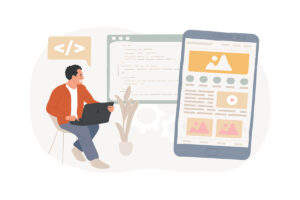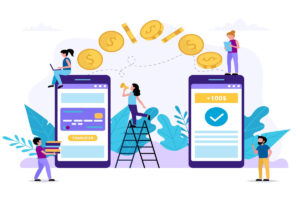In today’s digital landscape, mobile app development has gained tremendous significance. It provides businesses with the opportunity to reach their target audience more efficiently and offers services at their fingertips. Developing a mobile app can be a daunting task, and it requires extensive knowledge and expertise. Therefore, it’s essential to hire a skilled mobile app developer who is the right fit for your project. In this guide, we’ll discuss the process of hiring a mobile app developer and how to ensure that you find the best fit for your app project.
Recognizing Your Needs
Prior to starting the hiring process, it is crucial to identify and define the specific requirements for your project. This step ensures that you engage an app developer with the appropriate skill set and level of experience, which can significantly impact the success of your mobile app. Here are some important factors to consider:
Type of App
Determine whether your app will be a native, hybrid, or web application. Each type has its own set of technical requirements and hence, needs a developer with a certain skill set.
Features and Functionality
List out the features and functionalities you want your app to have. This could range from user accounts, social sharing, GPS, and payment integration, among others.
User Interface Design
Consider how you want your app to look and feel to the user. A well-designed user interface can significantly enhance the user experience, making your app more appealing to your target audience.
Backend Requirements
Depending on the complexity of your app, you may require a developer with experience in database management and server-side scripting.
Platform Compatibility
Decide whether you want your app to be available on iOS, Android, or both. This decision will influence your choice of a developer as different platforms require different coding languages.
Maintenance and Updates
Mobile apps require regular updates and maintenance to fix bugs, add new features, and keep up with changes in platform standards. Be sure to consider this ongoing work in your hiring decision.
By understanding these factors, you will be better equipped to select a candidate who can bring your mobile app concept to life effectively.
Searching for Candidates
Once you have a clear understanding of your app’s requirements, you can begin the candidate search. Here are some key steps you might consider:
Networking
Leverage your professional network to find potential candidates. LinkedIn can be a particularly useful tool for this. Many skilled mobile app developers are connected through communities online, and tapping into these networks can yield a rich array of potential candidates.
Job Posting Sites
Websites like Indeed, Glassdoor, and Monster are well-trafficked by job seekers in the tech industry. Create a detailed job posting, outlining your app’s requirements and the essential skills you’re looking for in a potential hire.
Freelance Platforms
Websites such as Upwork, Fiverr, and Freelancer host a vast number of freelance developers. These platforms allow you to post project-specific job requirements for hiring a mobile app developer on a contract basis.
Tech Job Fairs
Job fairs, hackathons, or meet-ups specifically geared toward the tech industry can be an excellent place to meet talented developers in person.
Referrals
Ask for referrals from industry acquaintances or colleagues. Personal connections often lead to trustworthy and reliable hires.
Remember, the goal is to find someone who not only has the technical skills you need but also shares your vision for the app and can work well with you and any existing team members.
Assessing Developer Skills and Experience
After identifying potential candidates, assessing their skills and experience becomes crucial. Here are some critical areas to focus on:
Technical Proficiency
Measure the developer’s skills in the technology stack required for your app. For instance, if you’re developing an iOS app, you should be proficient in Swift or Objective-C. For Android apps, knowledge of Java or Kotlin is necessary.
Portfolio Review
Scrutinize the developer’s previous work. Checking out their portfolio will give you an insight into their capabilities, design aesthetics, and attention to user experience.
Problem-Solving Skills
Assess their ability to solve complex problems. They should be able to provide feasible solutions to potential challenges during the app development process.
Communication Skills
Good communication is vital in app development. The developer should be able to effectively express their ideas, understand your vision, and provide regular project updates.
Teamwork and Collaboration
If the developer will be working with your existing team, they should possess good team collaboration skills. They should be willing to take feedback, make necessary adjustments, and work in unison with other team members.
Adaptability
Technology trends change rapidly. The developer should show a willingness and ability to adapt to new technologies and tools as needed.
Experience with the Full Development Cycle
The developer should have experience with all stages of development, from conceptualization to launch and maintenance. This ensures they can handle the project from start to finish.
By thoroughly evaluating these areas, you’ll be better equipped to select a developer who can bring your app concept to life effectively and efficiently.
Conducting Interviews
Once you’ve shortlisted potential developers based on the criteria listed above, conducting interviews is the next crucial step. Here are some areas to focus on during the interview process:
Technical Expertise
Ask specific questions related to the programming languages and platforms they are proficient in. This could include questions about their experience with Swift, Objective-C, Java, or Kotlin. You should also ask about their ability to use various development tools and their familiarity with the latest app development trends.
Problem-Solving Approach
Present hypothetical challenges or problems related to app development and ask how they would address them. This will give you a good idea of their critical thinking, creativity, and problem-solving skills.
Previous Work
Discuss the projects showcased in their portfolio in detail. Ask about the challenges they encountered during these projects and how they overcame them. This can provide deeper insight into their practical skills and adaptability.
Communication and Collaboration
Evaluate their communication skills by observing how well they respond to your questions, articulate their thoughts, and show comprehension of your business needs. Ask them to share instances where they worked as part of a team and to describe their approach to collaboration and feedback.
Adaptability
Discuss their experiences with rapidly changing technology trends. Ask how they keep themselves updated and how they adapt when they need to learn new technologies or tools.
Full Cycle Development Experience
Ask them to walk you through a project they’ve handled from start to finish. This will help assess their understanding and capability to manage the complete lifecycle of app development.
Remember, it’s not just about finding a developer with the right skills, but also one that aligns well with your business vision and culture.
Making the Decision
Once all the interviews are concluded, it’s time to make your decision of hiring a mobile app developer. Here are key factors to consider:
Technical Expertise
Review the notes from your interviews regarding the candidate’s technical abilities. Validate their proficiency in the development tools and technologies crucial to your project.
Problem-Solving Skills
Reflect on the solutions they proposed for the hypothetical challenges. A developer with a unique, effective, and efficient problem-solving approach could be a great asset.
Portfolio Analysis
Reflect on the past projects they’ve worked on, the hurdles they’ve overcome, and the success they’ve achieved. Their track record can be a good predictor of their performance on your project.
Communication and Collaboration Skills
Consider their ability to effectively communicate their ideas and understand your business needs. Good collaboration skills are essential for integrating into your team.
Adaptability Quotient
Gauge their adaptability skills based on the instances they provided about learning and implementing new technologies. The tech world is ever-evolving, so adaptability is key.
Lifecycle Management Skills
Think back to the project they walked you through from start to finish. Their ability to handle all stages of the development process is essential for the smooth execution of your project.
Fit with Company Culture
Finally, remember that the developer will be a part of your team, potentially for a long time. Make sure their work style, ethics, and personality fit well within your company culture.
Weigh all these factors carefully as you make your decision. The right developer will have the necessary skills and be a good fit for your company.
Onboarding the Developer
Once you have selected the right developer for your project, successful onboarding is critical to integrating them into your team and getting your project off to a strong start. Here are some key steps to consider:
Introduction to the Team
Give the developer a warm welcome and formally introduce them to each team member. Schedule an initial team meeting to discuss team dynamics, roles, and communication protocols.
Project Overview
Provide a comprehensive brief about the project. This should include project objectives, deadlines, technology stack, and any relevant industry specifics the developer should be aware of.
Role Specifics
Outline their specific role and responsibilities within the project, and what is expected of them. Clear expectations can prevent potential misunderstandings down the line.
Resource Access
Ensure the developer has access to all the tools, resources, and software they’ll need to perform their duties effectively. This includes access to project management tools, code repositories, and any necessary software licenses.
Training
If the project requires the use of a specific software or technology that the developer is not familiar with, arrange for training sessions. This will help them get up to speed and maximize their productivity.
Feedback Channels
Establish clear feedback channels. Make sure the developer knows who they should report to, and how they should deliver updates on their progress.
Company Culture Overview
Provide an overview of the company culture. This could include details about work hours, team traditions, company values, and any other information that will help the developer feel like part of the team.
Take the time to execute each of these steps carefully. A well-orchestrated onboarding process can ensure that your new developer feels welcomed, understands their role, and is ready to contribute to the project.
Conclusion
In conclusion, hiring a mobile app developer is a meticulous process but one of great importance. Following these steps will assist you in making an informed decision, thereby contributing to the success of your mobile app development project. Remember, the developer you hire can significantly influence your app’s success, making this process even more crucial. By considering their skills, experience, and other factors mentioned above, you can ensure that you choose the right option of hiring a mobile app developer for your project. With a well-qualified and experienced developer on board, you are one step closer to creating a successful and high-quality mobile app. So, take your time, do your research, and make the best decision for your project’s success!











+ There are no comments
Add yours